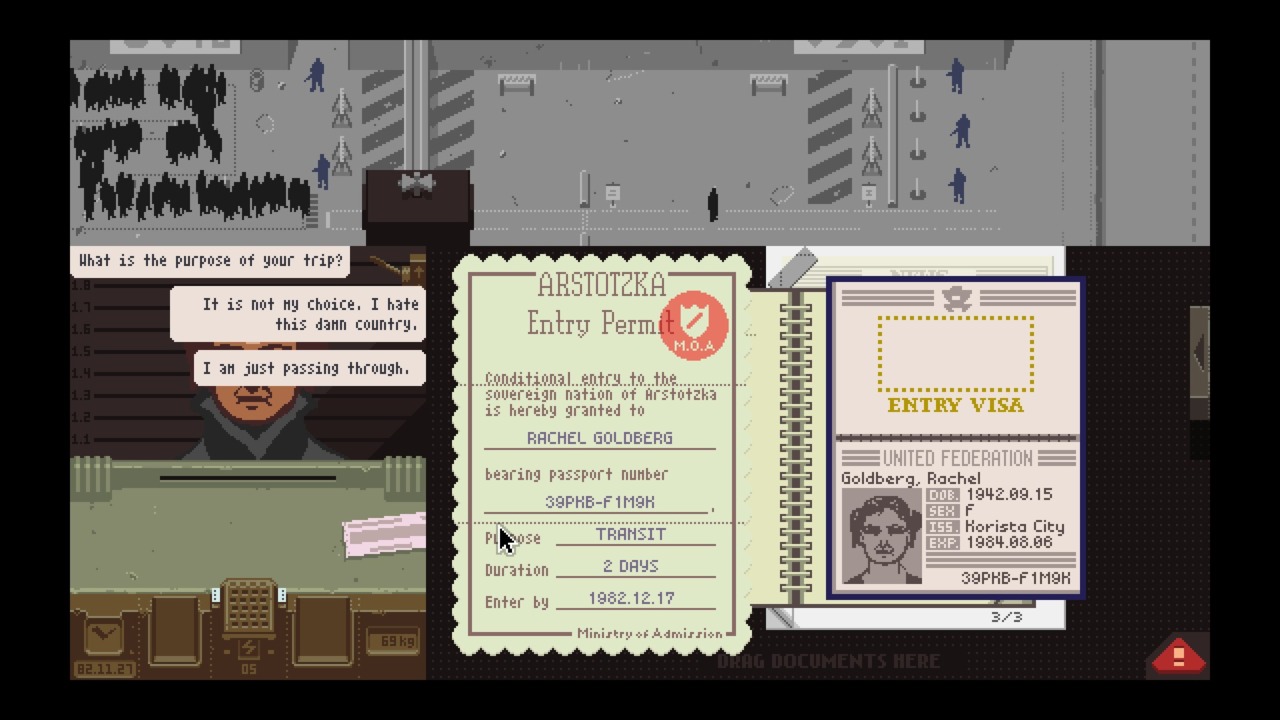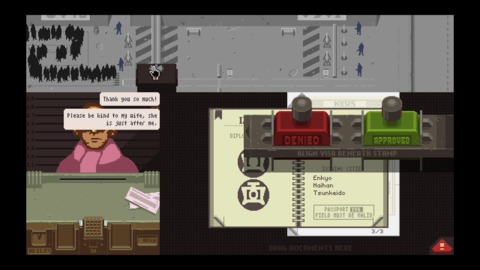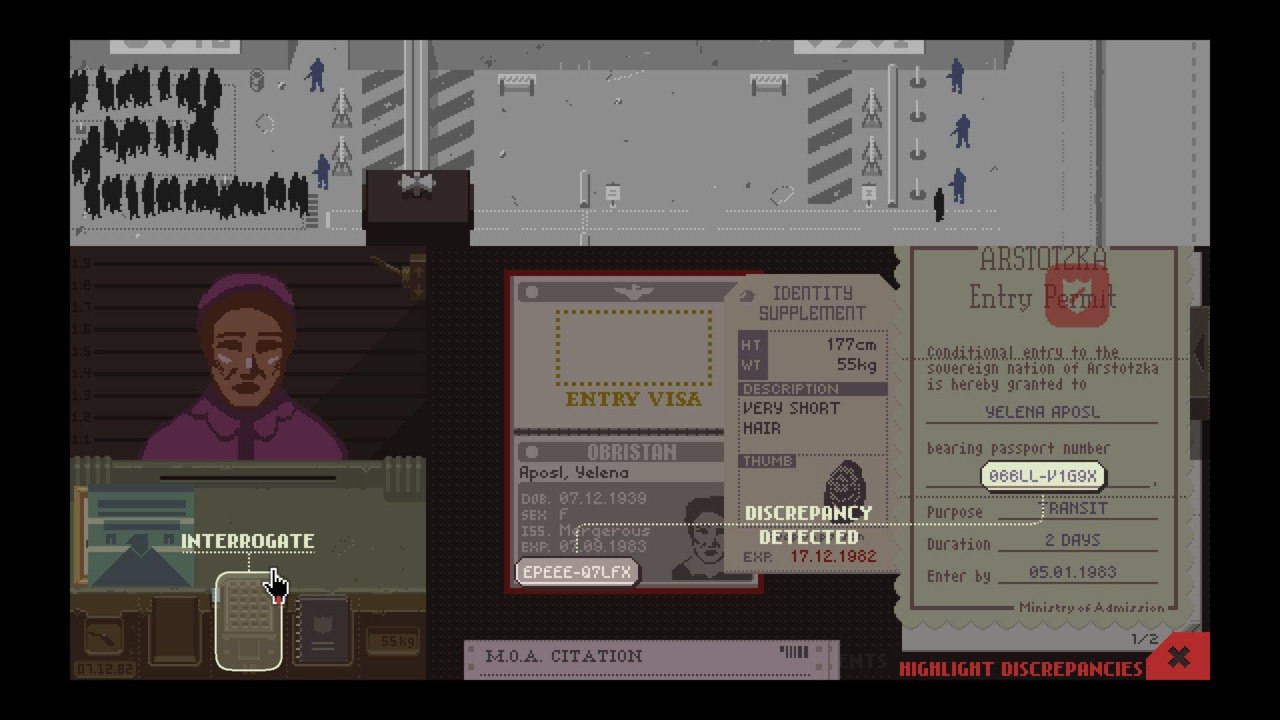Paperwork is never really "exciting." It's monotonous, it can be stressful, and it's rarely very rewarding. Compared to the power fantasies we often experience in games, Papers, Please strips you of just about any sense of control you might expect to have. You are not important, you will never experience the world outside your work desk, and you will perform your job to the best of your ability or suffer the consequences. By making the stakes high and incredibly personal, Papers, Please makes you care about virtual paperwork more than you ever have before.

You begin by winning your low-wage, thankless border-inspection job in a lottery, which immediately tells you much about your country of residence. You are given a small Class-8 apartment with which to house your family. Every passport you process at the border earns you five credits, so to pay for rent, heat, and food (not to mention the occasional extra expenses, like medicine), you want to work as quickly as possible, getting to as many people as you can each day.
A steady stream of citizens and foreigners come up to your inspection booth, waiting for you to decide whether or not they will be granted access to your country, whether you'll stamp "Approved" or "Denied." And that's the crux of what you do day after in-game day, making sure documents are current, making sure the T's are crossed and the I's are dotted. You aren't typically solving puzzles or progressing through dialogue trees; you're merely checking facts. At the end of each day, you decide where to spend the money you've earned in a rather Oregon Trail-like checklist of family necessities. If you don't make enough to afford everything you need, tough choices might have to be made between food and medicine.
Papers, Please begins simply, but as time goes on, the rules get more strict, requiring you to check more paperwork and jump through more hoops to make sure you're letting in the right people. Because you have to pay attention to more details, your desk becomes increasingly cluttered and hard to deal with. Even with the rule book right in front of you, it's easy to lose track of what you need to look for. Every second wasted double-checking the rules means another second you can't get more money. Before long, you find yourself stressed about every detail and how long each task takes. The game becomes more compelling, but not more "fun," really. This is not a game to play if you intend to relax before going to bed.

Papers, Please sounds mundane, and in some ways it is. You take paperwork. You check paperwork. You hunt for and point out discrepancies. You approve or deny paperwork. You call "Next!" and do it all again, over and over, trying to be both speedy and accurate. The game is well made enough to keep your attention with these mechanics, but the real draw comes from the story that's told based on the decisions you make.
You meet many different people while working. Some are rude. Some are kind. A few might even make you chuckle. But what do you do when the kind ones come through hoping to find a better life in your country, only to find that their paperwork isn't in order? What do you do when you know someone is going to perform vile acts as soon as he crosses your border, but you have no legal reason to refuse him entry without getting in trouble for it? There are also other forces at work here, asking you to do questionable things for what may or may not be the greater good. Whom do you trust? How do you proceed? Think quickly, because the clock is ticking.
There are often no tangible benefits for doing the moral thing in these cases. There is no paragon meter to fill, no guarantee of a sweeter reward on the other side. Being immoral might actually make things much easier on you and your family. The only thing keeping you from doing the wrong thing is your own conscience.

But the moral quandaries are so real, so relatable that your conscience speaks to you more than it does in most other games. The decisions feel like they matter. Even if you're the kind of person to always take the "lawful good" route, to always take the high road in games, you're forced to commit acts for which you might hate yourself. If you don't, you and your family will not survive the winter. The fact that a few sentences of text accompanied by retro-style graphics can make you feel as bad as you do is impressive.
So maybe you occasionally stick your neck out for somebody in need. You can make two mistakes a day without penalty, so if you're good at your job, perhaps you can afford to let a rule or two slide for the sake of keeping a family together. Or maybe you'll be more selective with your "generosity," choosing to help only those who can make it worth your while with bribes or favors. Maybe you'll develop and obey your own kind of morality, like only detaining people who try to smuggle in weapons or drugs (bonuses for detaining people be damned).
In many ways, you are forced to become the kind of person that many real-life people despise. By putting you in the shoes of a regular man in a contemptible position working for a corrupt system, Papers, Please forces you to understand and pity someone you may normally not give a second thought to. That in itself is an accomplishment for any storytelling medium. There is a greater story being told over the course of the game's 30 or so days (the length varies depending on several factors), at the conclusion of which you earn one of 20 endings. The tale of spies, terrorism, and corrupt governments is engaging despite its relative simplicity.

But it's not unsatisfying as a pure game, either, despite its repetitive nature. There is plenty to make this much more than a simple choose-your-own-adventure narrative. When the story ends, you can unlock a set of endless modes that let you keep playing if you want, with online leaderboard spots to compete for. Endless mode is far from the game's main attraction, but it's a good addition for those who find something to like about the act of checking papers itself.
Papers, Please will stress you out. At times it may even make you hate yourself. And while it's weird to call such an experience "enjoyable," the gameplay itself is not a miserable time. It's worthwhile for the same reasons a depressing novel or a bleak movie can be worthwhile. There are lessons to be learned from Papers, Please, if only to remind ourselves how much worse off we could be.